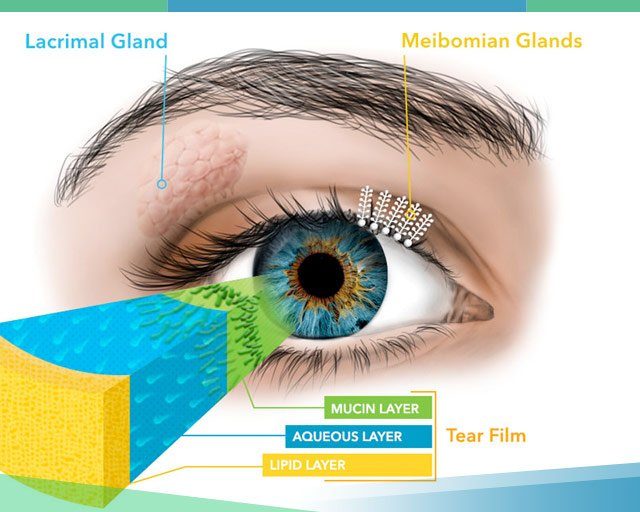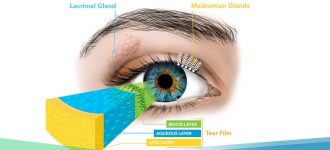
Dry Eye and MGD
Understanding MGD
Many commonly attribute their eye discomfort to dry eye, when a leading cause of the burning, scratching and redness is Meibomian Gland Dysfunction or MGD.
MGD occurs when there is a compromise to the function and/or structure of the Meibomian glands. These glands, located in the eyelids, produce the protective oily (lipid) layer of the tear film. This oil helps protect the surface of the eye from disease and prevents the watery part of the tears from evaporating when your eyes are open. Without these oils, the eyes become more susceptible to the negative effects that dry climates, air conditioning, computer use, reading and other daily activities can have on the long-term health of our eyes.

LipiFlow is a treatment performed in your doctor's office designed to remove blockages from the Meibomian glands, allowing them to properly function and produce the oils that make up the top protective lipid layer of the tear film. LipiFlow is supported by more than 30 patents with studies demonstrating its safe and effective results.' It is designed to minimize patient discomfort during a 12-minute treatment that gently massages the eyelids.
LipiFlow Activators are single-use sterile devices that safely and comfortably deliver a combination of heat to the inner lids and simultaneous therapeutic motion to the outer lids, removing blockages from the Meibomian glands.' The Activators are contoured to avoid contact with the cornea, protecting the delicate structures of the eye.
Once the gland blockages are removed, the glands can resume normal oil or lipid production. This oil is essential for a healthy tear film, providing stable vision and ocular comfort. As normal gland function recovers, maximum results are usually experienced 6-8 weeks after treatment

Treating MGD with LipiFlow
LipiFlow is a treatment performed in your doctor's office designed to remove blockages from the Meibomian glands, allowing them to properly function and produce the oils that make up the top protective lipid layer of the tear film. LipiFlow is supported by more than 30 patents with studies demonstrating its safe and effective results.' It is designed to minimize patient discomfort during a 12-minute treatment that gently massages the eyelids.
LipiFlow Activators are single-use sterile devices that safely and comfortably deliver a combination of heat to the inner lids and simultaneous therapeutic motion to the outer lids, removing blockages from the Meibomian glands.' The Activators are contoured to avoid contact with the cornea, protecting the delicate structures of the eye.
Once the gland blockages are removed, the glands can resume normal oil or lipid production. This oil is essential for a healthy tear film, providing stable vision and ocular comfort. As normal gland function recovers, maximum results are usually experienced 6-8 weeks after treatment.

LipiFlow® Safety Information
INDICATIONS FOR USE
The LipiFlow® System is intended for the application of localized heat and pressure therapy in adult patients with chronic cystic conditions of the eyelids, including Meibomian Gland Dysfunction (MGD), also known as Evaporative Dry Eye or Lipid Deficiency Dry Eye.
CONTRAINDICATIONS
Do not use the LipiFlow® System in patients with the following conditions. Use of the device in patients with these conditions may cause injury. Safety and effectiveness of the device have not been studied in patients with these conditions.
- Ocular surgery within prior 3 months, including intraocular, oculo-plastic, corneal or refractive surgery procedure
- Ocular injury within prior 3 months
- Ocular Herpes of eye or eyelid within prior 3 months
- Active ocular infection
- Active ocular inflammation or history of chronic, recurrent ocular inflammation within prior 3 months
- Eyelid abnormalities that affect lid function
- Ocular surface abnormality that may compromise corneal integrity

PRECAUTIONS
The Activator or Activator II (Disposable) may not fit all eyes, such as small eyes (eyes with small palpebral fornices).
Use of the LipiFlow® System in patients with the following conditions may result in reduced treatment effectiveness because the conditions may cause ocular symptoms unrelated to cystic meibomian glands. Safety and effectiveness of the device have not been studied in patients with these conditions.
- Moderate to severe (Grade 2-4) eye allergy (allergic vernal, or giant papillary conjunctivitis)
- Severe (Grade 3 or 4) eyelid inflammation. Patients with severe eyelid inflammation
should be treated medically prior to device use.
- Systemic disease conditions that cause dry eye
- Taking medications known to cause dryness
- Esthetic eyelid and eyelash procedures
In addition, the treatment procedure may loosen previously inserted punctal plugs, which may worsen the patient's dry eye symptoms.
